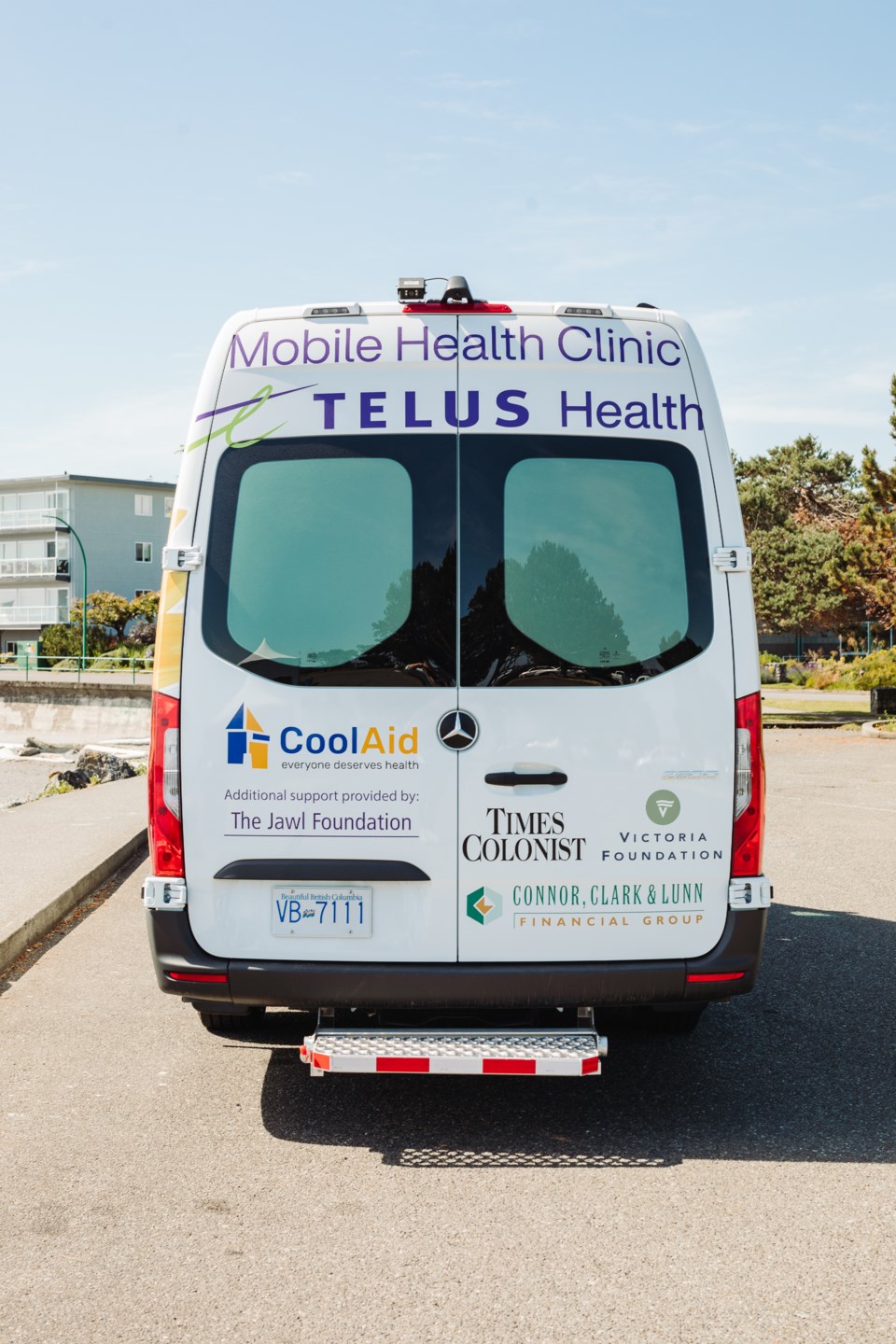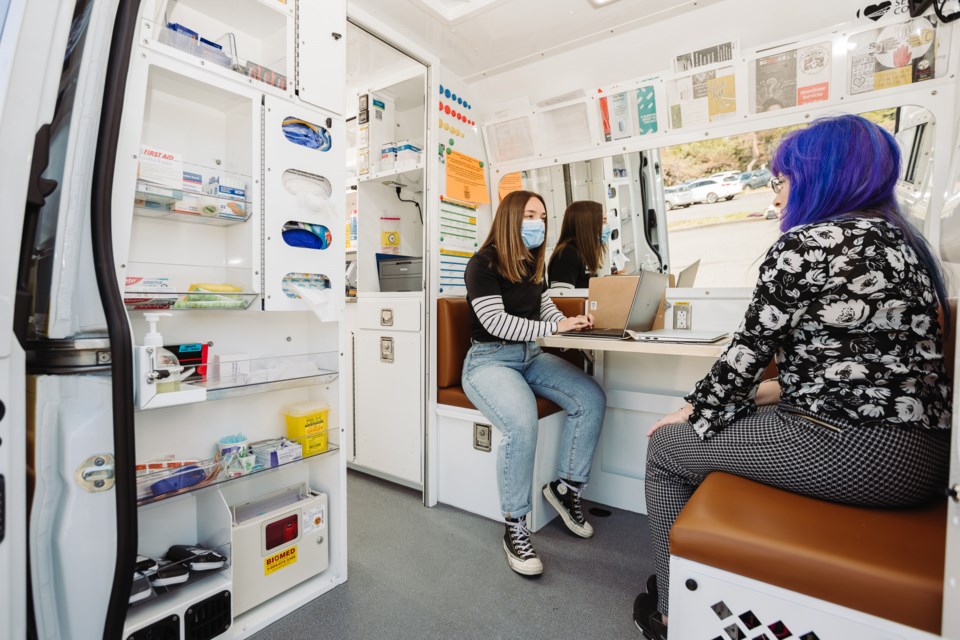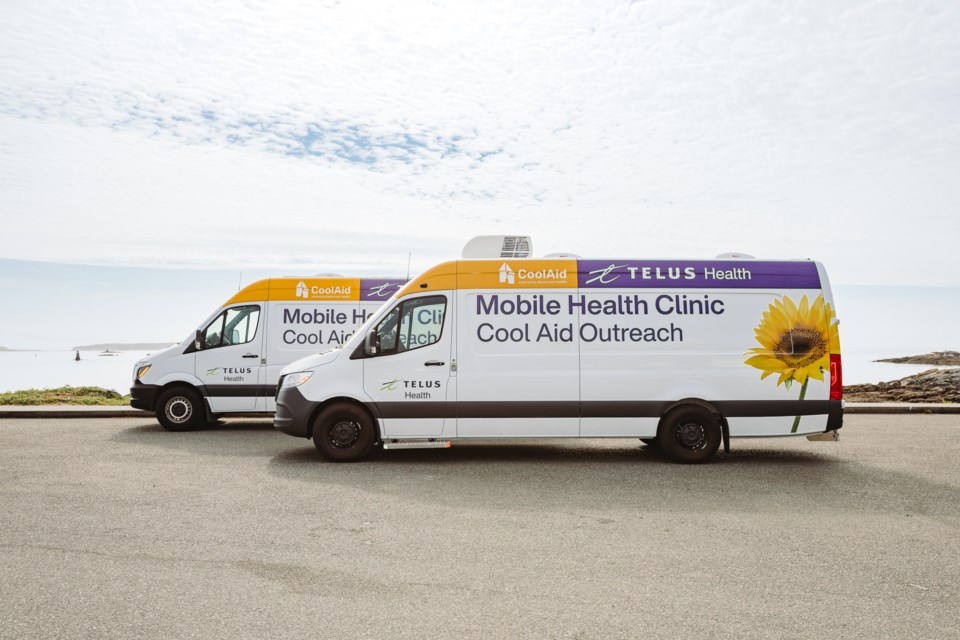The Victoria Cool Aid Society is doubling down on its efforts to bring vital health services and low-barrier care to the underserved in the community with the addition of a second mobile health clinic.
Through a partnership with the program, has launched a second mobile clinic, which began providing care on the streets this summer. Housed in a Sprinter van, the clinic is equipped with state-of-the-art technology — including TELUS Health electronic medical record technology and Wi-Fi services for improved continuity of care.
The first mobile clinic, in June 2021, rotates through 24 sites in Greater Victoria every two weeks – from shelters and soup kitchens to parks and food banks – offering much-needed health and support services to residents in need of care.
This second, new mobile clinic will help double the sites Cool Aid is able to support, opening up even more opportunities to meet, engage and treat vulnerable people right where they are.

“Right now, we run the original van five days a week, seven hours a day, and the new clinic will be following a similar schedule,” says Candide Dias, Cool Aid’s coordinator for outreach health services. “We see a possible future where these vans could, one day, be running 24/7 — there’s that much need. It’s hard for the team to pull away when there are more people to be seen, and while round-the-clock operations aren’t a reality yet, this second clinic will allow us to increase our support exponentially”.
Before the second mobile clinic had even hit the road, Dias says multiple organizations that work with marginalized populations from across the capital region were already asking for Cool Aid to add them to the rotation.
“The schedule will be full,” says Dias.
Commitments going above and beyond technology
Victoria, like many urban communities in North America, is experiencing increasing challenges with homelessness and addiction – a situation that has only deepened since the COVID pandemic. The last completed of Victoria homelessness conservatively estimated some 1,500 people face homelessness nightly in the capital region. Many of these individuals are in dire need of health services, including primary care, harm reduction and mental health support and are living with the effects of trauma. In addition to the barriers this population faces to accessing health care services, it is also at the epicentre of the overdose and toxic drug crisis.
Helping to address that need is one of the reasons TELUS launched its Health for Good mobile clinic program in 2014. To date, TELUS mobile clinics — powered by — have connected marginalized individuals in sa国际传媒, regardless of their socio-economic status, with health-care practitioners in 24 communities across the country, marking over 170,000 patient visits.
The tech company continues to grow the program, recently announcing an increase of its investment to $13 million through 2026, and a goal to facilitate at least 50,000 patient visits across its network of mobile clinics nationwide per year. Additionally, the program recently expanded to offer free counselling services and subsidized subscriptions to select low-income groups.
As the largest Canadian health IT provider, TELUS feels a responsibility to use the power of tech to deliver better health outcomes for marginalized individuals. By partnering with community leaders like Cool Aid and offering mobile clinics, TELUS is helping to provide much-needed medical services to those most in-need across sa国际传媒, bringing those services directly to them.
That commitment to care often goes beyond technology. In Victoria, for instance, a group of team member volunteers recently worked with Cool Aid to bring much-welcome improvements to Sandy Merriman House, Cool Aid’s 25-bed women’s emergency shelter.
TELUS team members deep cleaned and brought in new furniture and decor for the house, before serving a meal for residents and staff.
Mental health worker Eileen, who first came to Sandy Merriman House as a client in the early 2000s, said the revamp was an emotional experience.
“It’s not so much just the furniture itself, but it’s providing a new space. It’s providing new hope,” she says.
And while the improvements were relatively straightforward, they have a lasting impact on those staying at the house — today and in the future.
“The people that are here want to feel like they’re not marginalized,” says Nance, a former Sandy’s resident. “So, to have a nice place, clean and nice things around them, that means a lot.”
Building life-saving relationships

Cool Aid’s director of health and support services, Mary Chudley says the organization is grateful for TELUS’s commitment to health care and its generosity when it comes to helping the community.
Cool Aid has been helping marginalized adults in Victoria for more than 55 years. Providing health care services, including world-renowned and award-winning HIV and Hepatitis C care, has been part of its offerings for the last 25 years through the organization’s community health centre, embedded clinics in temporary housing sites and the more-recent additions of the vans.
Funding and service support from partners, including the TELUS Health for Good program is a crucial part of helping Cool Aid do its work, says Chudley.
“Of those living precariously, a large majority are already being supported in some way by Cool Aid,” says Chudley. “But the mobile clinics enable us to continue to meet new folks that have not
been engaged in the healthcare system, or with providers that work from a trauma-informed perspective, essential for this work.”
“There are numerous barriers – poverty, substance use, mental health challenges, complex-care needs, stigma often faced in combination with other complexities that are only exacerbated by underhousing – preventing many of our clients from accessing traditional healthcare services,” says Dias.
But it can also be that they’ve had bad experiences with traditional health care, she adds — which is why Cool Aid’s mobile clinics are so important. The familiar faces and a consistent presence offered by the van on its regular rotation can help build relationships, which make people more likely to access care.
“The van is a way to meet people where they are and where they are comfortable. We don’t force people to engage, but the potential goes up with each visit,” says Chudley.
Building those relationships also depends on consistent staffing and predictable scheduling — something the additional van will bolster.
Two nurses, a doctor and an outreach worker — someone who can offer housing forms, knows how to apply for funding, and can connect clients to appropriate resources — are in the van at any given time, allowing for myriad opportunities to offer help.
Since Cool Aid, with support from the TELUS Health for Good program, launched their first mobile health clinic in July 2021, more than 14,000 medical interventions and encounters have been provided, with services including prescriptions, wound care, blood tests, the distribution of much-needed harm reduction supplies, over-the-counter supplements and medications, hygiene products, snacks and water.
“It’s far more cost-effective to intervene with early medical treatment through the vans,” says Chudley, noting that for those who haven’t seen primary care in years, Cool Aid’s health services have been shown to decrease emergency room visits from dozens to just one or two (annually), relieving some of the burden on a strained medical system.
“Programs like this save thousands of lives each year,” she says.
To learn more about how TELUS is creating better health outcomes for all, visit .



